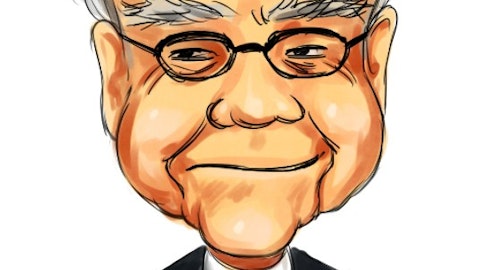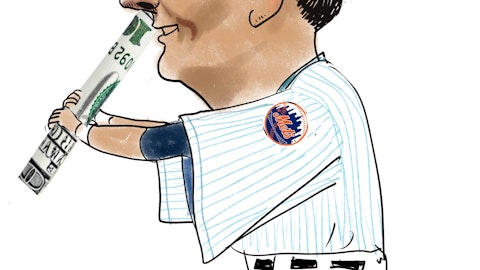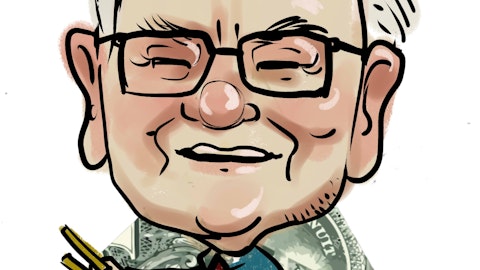PepsiCo, Inc. (NYSE:PEP), has underperformed the S&P 500 year-to-date by 8%. The company’s performance can somewhat be attributed its 0.4 beta; however, The Coca-Cola Company (NYSE:KO) is up 9% year-to-date, an underperformance of the S&P 500 by 5%. Pepsi sells key brands, such as Lay’s, Ruffles, Doritos, Pepsi and Gatorade. The company is looking to regain position in the U.S. and broad North American market, after having focusing on increasing its exposure to international markets with the completion of the purchase of Wimm-Bill-Dann, one of Europe’s largest dairy products companies.
Pepsi’s international focus has somewhat offset the decline of beverage sales in North America, but Pepsi has been losing North American market share to Coca-Cola as a result. Pepsi plans to spend upwards of an additional $600 million annually to boast its Mountain Dew, Pepsi and Gatorade sales in the region.
We would be remiss if we failed to have a direct comparison of Pepsi to its largest direct competitor Coca Cola—also see our thoughts on whether Coca-Cola is a good buy. Coca-Cola saw sales up 32% in 2011, but top line revenue is only expected to grow 5% in 2012 and 2013. While Pepsi appears to taking an interest in regaining market share in North America, Coca-Cola is being encouraged internationally with double-digit growth in India and high single-digit growth in China.
The other top beverage and snack company in the industry is Dr. Pepper Snapple Group Inc. (NYSE:DPS). Dr. Pepper is the third largest distributor of non-alcoholic beverages in North America and is expected to grow revenue 2.7% in 2012, but does have a less diverse product mix when it comes non-carbonated beverages. Earlier this year S&P put its price target on the stock at $47; Dr. Pepper currently trades around $43.66.
Pepsi’s other key competitor in the beverage industry is Monster Beverage Corp (NASDAQ:MNST). Monster is focused on alternative/energy beverages, which includes key brands Monster Energy and Java Monster. Monster shares took a hit last week on a downgrade by Stifel Nicolaus. The firm cited Monster’s slowing sales growth and possible regulatory risks. Analyst Mark Astrachan further noted that the major regulatory risks include the New York state attorney general’s investigation into the marketing practices of the company. However, Pepsi was also included in the attorney general’s round of subpoenas as part of the investigation; Pepsi is the maker of the energy drink AMP. The big problem-facing Monster is that energy drinks still remain a very small portion of the beverage industry, making up around 3% of sales volume.
Pepsi also has partnerships with other major beverage companies, such as Starbucks Corporation (NASDAQ:SBUX), for offering their products in conjunction with Pepsi’s—namely their Starbuck’s DoubleShot and Frappuccino brands. Starbucks’ products are expected to see increased demand as spending on small discretionary items rises. Last week, Pepsi announced that three more key beverages that it sales hit the $1 billion in annual revenue mark. This includes Starbucks’ pre-made beverages, as well as Diet Mountain Dew and Brisk.
In terms of fund interest, Pepsi most notably saw Ken Griffin taking a renewed interest in the company and upping his stake over 6,000% last quarter. However, it appears Griffin took a more notable interest during 2Q in Dr. Pepper. Griffin increased his 1Q stake by almost 100,000% in Dr. Pepper, while Bill Miller also took a new position in the company.
Of the top three beverage/snack companies, it appears that Dr. Pepper trades at a sizable discount to the peers. Coca-Cola trades at a P/E of 20 and P/S of 3.7, the highest on a multiples basis, with Pepsi in the middle at a P/E of 18 and P/S of 1.6. However, of interest to us is Dr. Pepper trading the cheapest on a P/E and P/S basis, 16x and 1.5x, respectively. The company pays a dividend above 3% and also has the lowest PEG ratio of the three. We believe the likeness and overlap that cause cannibalistic competition between Coca-Cola and Pepsi is absent for Dr. Pepper, which may give it the best growth opportunity going forward.






